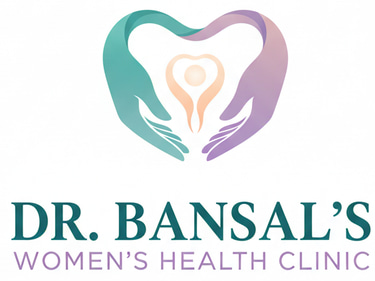Hyperemesis Gravidarum Treatment in Indore
Dr Bansal's Women's Health Clinic
Hyperemesis gravidarum:
HG is a severe form of nausea and vomiting during pregnancy, far beyond the normal “morning sickness.”
It can cause dehydration, electrolyte imbalance, malnutrition, and weight loss, which in turn may also require medical intervention.
ICD-10 Code: O21.1
Onset: Usually starts in the first trimester: weeks 4–10
Duration: May continue throughout pregnancy, but often improves after 20 weeks
⚕️ Difference Between Morning Sickness and HG
Feature/Morning Sickness/Hyperemesis Gravidarum
Frequency of vomitingOccasionalPersistent (several times daily)
Weight loss Minimal >5% of pre-pregnancy weight
Dehydration No Yes
Need for hospitalization\tRare\tCommon
Impact on daily life为空Mild to moderate MEDSevere, disabling
Causes and Risk Factors
The exact cause is not fully understood, but a number of factors are believed to contribute:
1. Hormonal Factors
Human Chorionic Gonadotropin (hCG): High levels correlate with HG.
Estrogen and progesterone may slow gastric motility and further contribute to nausea.
2. Genetic Predisposition
Family history of HG increases the risk.
Recurrence in subsequent pregnancies is common.
3. Gastrointestinal Factors
Helicobacter pylori infection has been suggested to play a role in some.
4. Psychological Factors
Previously thought to be psychogenic, but now thought to be secondary to physiological causes. Stress may exacerbate symptoms.
5. Other Risk Factors
First pregnancy
Multiple gestations (twins, triplets)
Molar pregnancy
Female fetus
Obesity
Hyperthyroidism
⚠️ Signs and Symptoms
Typical symptoms include:
Severe and persistent nausea and vomiting
Inability to keep food or fluids down
Weight loss of >5% of pre-pregnancy body weight
Dehydration: dry mouth, sunken eyes, decreased urine output
Fatigue and dizziness
Ketonuria-starvation ketones in the urine
Electrolyte imbalances, especially low potassium
Tachycardia, hypotension
Diagnosis
Diagnosis is clinical, supported by laboratory findings.
Diagnostic Criteria:
Persistent vomiting not due to other causes
Weight loss >5% of pre-pregnancy weight
Ketonuria or ketonemia
Electrolyte imbalance: ↓Na⁺, ↓K⁺, ↑Hct
Absence of other medical conditions causing vomiting (e.g., hepatitis, UTI)
Investigations
Urinalysis: Ketonuria, specific gravity ↑
Blood tests: electrolyte disturbances, increased hematocrit, renal function
Thyroid tests: to exclude thyrotoxicosis
Ultrasound: exclude multiple or molar pregnancy
Treatment and Management
1. Supportive Therapy
Hospitalization if severe dehydration or weight loss
IV fluids: Normal saline with potassium supplementation
Electrolyte correction
Vitamin replacement: Thiamine (B1) prior to glucose for prevention of Wernicke’s encephalopathy
2. Nutritional Support
Small, frequent meals
Avoidance of triggers: strong odors, spicy/fatty foods
Dry foods (toast, crackers)
High-protein snacks
In severe cases: enteral-nasogastric or parenteral nutrition
3. Pharmacologic Treatment
(Given under medical supervision)
Drug Class Examples Notes
Antiemetics Metoclopramide, Ondansetron, Promethazine First-line or second-line therapy
Antihistamines Doxy-lamine, Diphenhydramine Commonly used
Vitamin B6 (Pyridoxine) 10–25 mg every 8 hrs Safe and effective
Corticosteroids & Methylprednisolone & For refractory cases only
Ginger supplements Natural remedy May reduce mild nausea
Complications
Maternal:
Severe dehydration and electrolyte imbalance
Wernicke’s encephalopathy due to thiamine deficiency
Mallory-Weiss tear (esophageal tear due to vomiting)
Psychological stress and depression
Liver and kidney dysfunction
Fetal:
Intrauterine growth restriction (IUGR)
Low birth weight
Preterm delivery
Rarely, fetal demise if severe malnutrition persists
Prevention and Self-Care Measures
Although it is not always possible to prevent HG, early recognition and management can lessen its severity.
Preventive Strategies
Preconception care:
Treat any underlying gastrointestinal or thyroid disorders.
Ensure good nutritional status before conception.
Early pregnancy care:
Start vitamin B6 and prenatal vitamins before conception or early in pregnancy.
Avoid strong odours and foods that provoke nausea.
Eat small, frequent meals; don’t let the stomach get empty.
Take small sips of fluids throughout the day to stay hydrated.
Adequate rest and stress management.
Monitor early symptoms:
If vomiting is persistent, or early weight loss occurs, consult a physician. Prognosis Most women improve by 20 weeks of gestation. Symptoms may repeat in later pregnancies. Maternal and fetal outcomes are usually good, provided there is proper management.
Wellness
Dr. Shreyas Bansal has over 46 years of experience in supporting women’s health and wellness. At Dr. Bansal’s Homeopathy Clinic, located at 2 Manish Bhag, Sapana Sangeeta Road, Indore, we offer personalised and gentle homeopathic care for women of all ages. Our treatments focus on balancing hormones, improving overall well-being, addressing menstrual and menopausal concerns, and promoting long-term health—helping every woman feel confident, healthy, and cared for naturally. Best Gynaecologist in Indore
Contact
Support
(+91) 9111110238
© 2025. All rights reserved.
